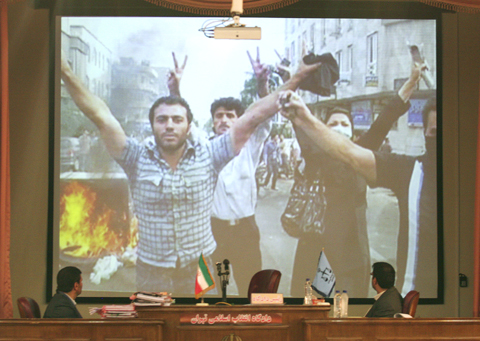Iranian President Mahmoud Ahmadinejad on Sunday attempted to soften his hardline image by nominating three women to his Cabinet following June’s disputed election.
As a new trial began of 25 more activists and opposition supporters, Ahmadinejad named Fatemeh Ajorlou, a member of parliament (MP), as social welfare minister and Marzieh Vahid Dastjerdi as health minister, with a third woman to be named later.
“With the 10th presidential election, we have entered a new era ... Conditions changed completely and the government [make-up] will see major changes,” Ahmadinejad said on state television.

PHOTO: AP
He also said Heydar Moslehi, his adviser on clerical affairs, would be nominated as intelligence minister. There were unconfirmed reports that the country’s chief nuclear negotiator, Saeed Jalili, would be named foreign minister.
Like Ahmadinejad, Jalili has taken an uncompromising stance in Iran’s dispute with the West over its nuclear program, which it defends as being for peaceful purposes.
But it is Ahmadinejad’s intention to have three women ministers that stands out in a society where women politicians are thin on the ground. There are only eight women among Iran’s 290 MPs.
During the election campaign, the defeated reformist candidate, Mir Hossein Mousavi, and his wife, Zahra Rahnavard, who holds a doctorate in political science, galvanized younger and female voters with promises to eliminate discrimination, abolish the “morality police” and “help the youth to think freely.”
Rahnavard emerged as the unlikely star of the presidential campaign. Ahmadinejad used a televised debate between the candidates to question the legitimacy of her doctorate. She then astonished the political establishment by accusing him of lying, debasing women and abusing his office, and threatened to sue him.
By seeking to promote women in his Cabinet, Ahmadinejad has taken on board the increased political clout of Iranian women, but the appointments — which have to be approved by parliament — are unlikely to appease reformists as both women named by Ahmadinejad are considered hardliners.
Mousavi announced plans over the weekend to create a political organization called the Green Path of Hope to restore constitutional rights. He said volunteer and social networks would form the mainstay of the organization, which he plans to be able to function legally within the political framework.
Mousavi said its goal would be to “defend the rights and votes of citizens that were crushed in the election.”
Following Ahmadinejad’s unexpectedly large majority in the June vote, hundreds of thousands of Mousavi’s supporters, wearing green, took to the streets claiming the election was fraudulent, in defiance of a government ban on political demonstrations.
Hardliners are increasingly calling for Mousavi to be put on trial along with hundreds of the regime’s opponents. During Sunday’s trial, one defendant, Mehrdad Aslani, accused Mousavi of planting the idea of election fraud in the mind of supporters. There have been no official indictments against Mousavi.
Earlier this month Iran held two other trials for more than 100 reformist politicians and activists accused of attempting to overthrow Iran’s Islamic system, including Hossein Rassam, chief political analyst at the British embassy and an Iranian citizen. The opposition has denounced the trials as a sham.

BLOODSHED: North Koreans take extreme measures to avoid being taken prisoner and sometimes execute their own forces, Ukrainian President Volodymyr Zelenskiy said Ukrainian President Volodymyr Zelenskiy on Saturday said that Russian and North Korean forces sustained heavy losses in fighting in Russia’s southern Kursk region. Ukrainian and Western assessments say that about 11,000 North Korean troops are deployed in the Kursk region, where Ukrainian forces occupy swathes of territory after staging a mass cross-border incursion in August last year. In his nightly video address, Zelenskiy quoted a report from Ukrainian Commander-in-Chief Oleksandr Syrskyi as saying that the battles had taken place near the village of Makhnovka, not far from the Ukrainian border. “In battles yesterday and today near just one village, Makhnovka,

US Secretary of the Treasury Janet Yellen on Monday met virtually with Chinese Vice Premier He Lifeng (何立峰) and raised concerns about “malicious cyber activity” carried out by Chinese state-sponsored actors, the US Department of the Treasury said in a statement. The department last month reported that an unspecified number of its computers had been compromised by Chinese hackers in what it called a “major incident” following a breach at contractor BeyondTrust, which provides cybersecurity services. US Congressional aides said no date had been set yet for a requested briefing on the breach, the latest in a serious of cyberattacks

In the East Room of the White House on a particularly frigid Saturday afternoon, US President Joe Biden bestowed the Presidential Medal of Freedom to 19 of the most famous names in politics, sports, entertainment, civil rights, LGBTQ+ advocacy and science. Former US secretary of state Hillary Rodham Clinton aroused a standing ovation from the crowd as she received her medal. Clinton was accompanied to the event by her husband, former US president Bill Clinton, daughter, Chelsea Clinton, and grandchildren. Democratic philanthropist George Soros and actor-director Denzel Washington were also awarded the nation’s highest civilian honor in a White House

Venezuelan opposition candidate Edmundo Gonzalez Urrutia was expected to meet Argentine President Javier Milei yesterday on a regional tour to drum up support ahead of Venezuelan President Nicolas Maduro’s swearing-in for a third term. Venezuelan authorities have offered a reward of US$100,000 for information leading to the capture of Gonzalez Urrutia, who insists he beat Maduro at the polls in July last year and is recognized by the US as Venezuela’s “president-elect.” The 75-year-old fled to Spain in September after being threatened with arrest by Maduro’s government, but has pledged to return to his country to be sworn in as